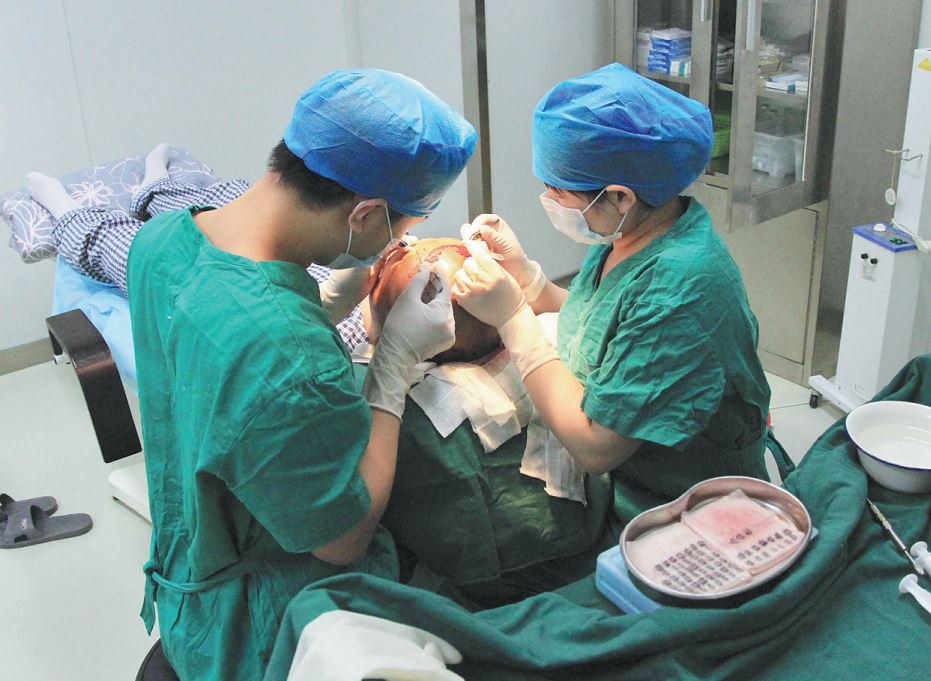Hair transplants growing in popularity


Rising incomes, changing attitudes and stronger advertising from industry players fueling market boom in China
It's 9 pm on a weekday, and Zhang Yanhua, a hair transplant surgeon with Cloud Hair BeauCare Clinic in Shenzhen, Guangdong province, is still busy at work.
The clinic, which specializes in hair-related cosmetic surgery and is a branch of Beijing-headquartered chain of plastic surgery clinics BeauCare Clinics, has been in full swing since the Spring Festival. Zhang, who is operational president of the facility, often works late.
As hair loss has become one of the top concerns for young Chinese people, who are losing their hair earlier than before, the hair transplant industry is also booming in China, mostly in the private sector, according to industry insiders.
Despite the lack of national surveys on hair loss problems in China, a recent report on the overall health of Chinese people showed hair loss among the top health concerns, ranking fifth after bad skin, depression and anxiety, poor sleep and digestive tract discomfort and illness.
About 31 percent of those born after 1990 said they suffer from hair loss, according to the report based on a survey with about 50,000 respondents nationwide.
The report was jointly released early this year by DXY, a leading online healthcare platform, and Health News, a national publication focusing on pharmaceuticals and healthcare.
Wang Wenhui, a senior dermatologist with Peking University Third Hospital, said hair loss can be heredity or result from illness, medication and an unhealthy lifestyle. Stress, staying up late, insomnia and dieting, among many other factors, are the main reasons that can aggravate hair loss.
Chinese people also frequently search for hair loss prevention and treatment on online healthcare platforms, the report said.
Last year, market research company iResearch said in a report that China's hair transplant market in 2017 was 9.2 billion yuan ($1.37 billion), with a year-on-year growth of more than 100 percent.
Liu Zheng, CEO of Lotus, a major chain of private hair transplant clinics, said industry insiders believe the country's hair transplant industry has already exceeded 10 billion yuan, and within five to 10 years the market value will be 50 to 100 billion yuan.
The company has more than 30 clinics nationwide, including in first-tier cities and most provincial capitals. Its revenue has risen by 60 percent annually in recent years.
"As Chinese people's living standards continue to rise, they are willing to spend more on their looks, a reflection of the ongoing consumption upgrade," Liu said.
"Young people especially are more prepared to have plastic surgery and hair transplants. They just cannot stand a receding hairline and being bald."
He said most of Lotus' clients are aged between 20 and 35, adding that with the devices and technologies developed in China, hair transplantation is a relatively safe procedure when performed by qualified surgeons in certified facilities.
Li Xuemei, head surgeon of a hair transplant team at Beijing-based JuvenateBeauCare Clinic, said she noticed a fast increase in demand for hair transplants from Chinese customers in recent years, most of whom are well-educated young men with high incomes.
Li explained that is because young people care more about appearance than older people, are willing to pay to look better, and are open-minded toward new experiences. Besides, hair loss is more likely to affect men than women, she said.
She also credited the booming market to rising incomes of Chinese people, and stronger advertising from industry players.
Zhang observed that more and more Chinese now see hair loss as something that can be solved, rather than a medical condition that they feel ashamed of.
"In the past, many people suffering from hair loss didn't know they could get help. Now, more of them are resorting to hair transplants to deal with the problem," Zhang said.




































